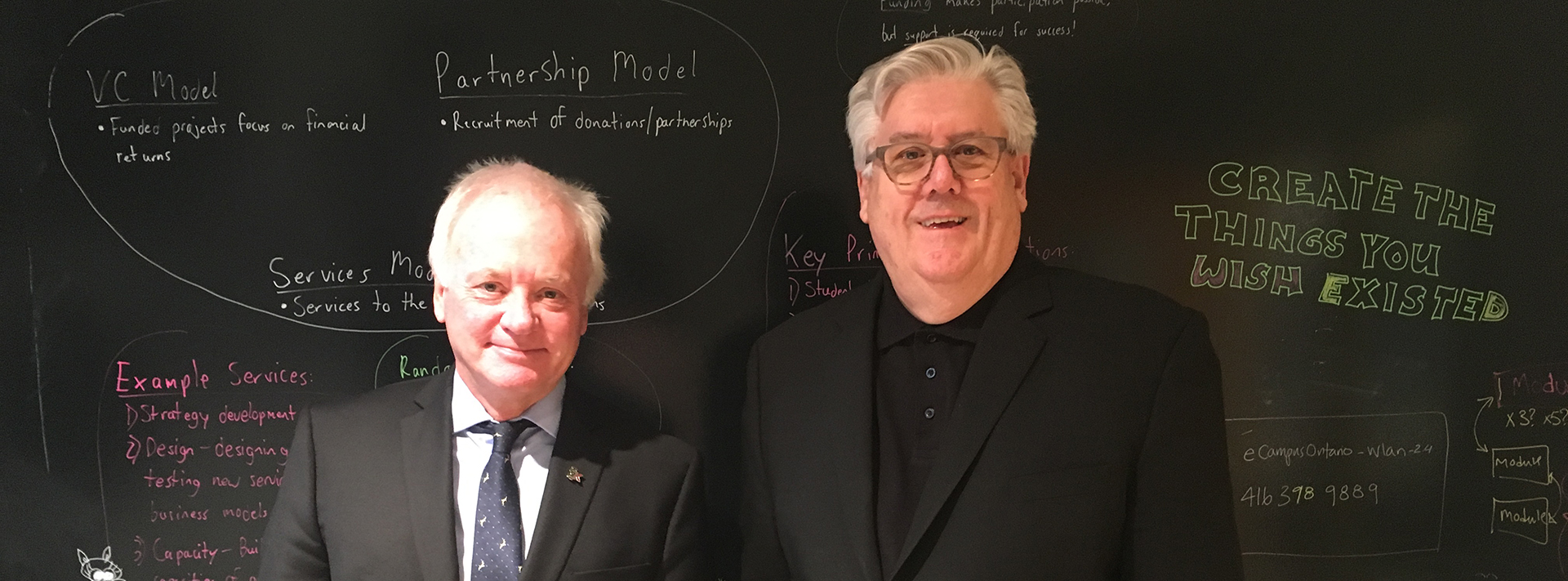
5 things Alan Davis wants you to know about open learning
Last month, eCampusOntario sat down with Alan Davis, President and Vice-Chancellor of Kwantlen Polytechnic University from Surrey, British Columbia. Under Davis’s leadership, Kwantlen has grown its influence in open education, particularly with its Zed Cred programs, fully-accredited courses that can be completed using open educational resources instead of paid textbooks.
Davis talked to eCampusOntario about new initiatives in open learning, the value of human elements and Canada’s deep roots in open education.
From your perspective, how did open learning begin?
“I can remember sitting down with my dad and watching the original Open University/BBC shows. They look a bit clunky now, but at the time were quite wonderful. These were academic courses being both broadcast with print components and supported by a tutoring system throughout the country. People actually met with their tutor locally, watched the TV shows and did the assignments. It was very successful.”
You’ve worked in the field for decades now, since you became the director of university programs at the Open Learning Agency. You also spent some time at Athabasca University in the ’90s. How have you seen open education evolve?
“The UK Open University is still arguably one of the best open institutions in the world and has been copied several times. It has been a huge part of the developing world’s creation of access. It was copied to some degree in Athabasca University and at the Open Learning Agency where I worked.
And then the web arrived and the whole thing took on its own energy. [New] people have come along with the technology and sometimes get the credit, as if they invented the idea. But, in fact, the ideas were already deeply planted.”
How is open education unfolding in Canada?
“[Distance education] has been very much a part of the Canadian landscape, given its size and the need for ongoing professional training. It really has been part of the Canadian fabric.
Canada is widely respected as a leader through all these influences of adult and distance learning, various approaches to online and blended learning, and the whole open educational resources field. The legacy is there and it will continue to evolve.
In the end, people are counting on educational leaders to provide them with what they’re going to need to thrive and survive in the new environment. We have to be prepared to do that. And open is going be a very big part of that. eCampusOntario is obviously one of the stronger groups right now, especially since it is looking ahead, moving ahead and exploring things that we should be exploring. The world around us is changing fast and there aren’t many aspects of higher education that are moving at the same speed.”
How is KPU contributing to the growth of open education?
“The biggest one, the most obvious contribution, is in open education textbooks, with funding originally through BCcampus, which is still going strong.
We have two Zed Creds now; two separate years of study towards credentials that are completely zero textbook cost. All the texts are either online, either things that we have written and published, or that others have published and are freely available. So that’s pretty fantastic. The savings to students now amount to millions per year.
[Another] thing is, the faculty have really enjoyed being involved. They now see themselves as being part of a shared purpose. Their textbooks are shared by others. They are using and remixing and adapting others’ textbooks. And the students are getting involved. As an assignment, some faculty members get their students to contribute a case study to a textbook in the course that they’re studying and that [content] gets posted.”
What do you think the future holds for learning and technology?
“I like to refer to Joseph Aoun’s Robot-Proof. He talks about everyone needing to be data and digitally literate, but also humanly literate. He creates this idea of humanics as the new skill that people need to have. The way to be robot proof is to understand what humans will always be able to do and can never replace, then align that with what’s happening in the technical world.
We must start thinking: How is my BA in History or my Bachelor of Business Administration aligned with what people are talking about as this new skillset? We need to be doing this not only so people will keep jobs, but also so they will be active and thriving participants in that new economy.”
